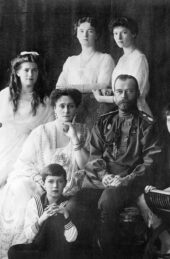Vladimir Putin clearly fancies himself something of a historian – even if, as a professional historian, I feel much of his ‘work’ would struggle to get a passing grade, laden as it is with factual inaccuracies and the careful cherry picking of evidence to fit his argument. His decision to invade Ukraine in 2022 seems heavily based on his questionable understanding of the historical relationship between Russia and Ukraine, for example, just as was his mistaken belief that the Ukrainians would not really resist with any vigour.
Generally autocrats who have been in power for a long time – 24 years in direct and indirect rule of Russia in this case – tend to surround themselves with cronies and yes-men and convince themselves of their own indispensability and infallibility. When the speaker of your own parliament coins the phrase ‘without Putin, there is no Russia,’ and when the patriarch of the Russian Orthodox Church hails your rule as a ‘miracle of God,’ then this is perhaps inevitable. However, it was especially unfortunate and noteworthy given not just Russia’s war-torn past, but also the effort that has gone into creating a national history threading from medieval Muscovy, through the imperial Russia of the Romanovs and the Soviet era, to today.
Time and again, Russia’s history has by definition been a military one not simply because of its environment and the threats and incursions of its neighbours but also its own assumptions about the world and the limited options it believes at its disposal. As Russian bombs rain down on Ukrainian cities, as Russian mercenaries buttress authoritarian regimes around the world, and as Russian intelligence officers hack systems and organize assassinations across the West, it is perhaps understandably unfashionable to suggest that insecurity, real and perceived, has been at the heart of so much of this country’s history. It sounds too glib, too much like an excuse. Yet it is not.
The tragedy in question – for Russia’s neighbours, of course, but also for the Russians themselves – is how far a pervasive sense of historical insecurity has bred a strategic culture that sees the world primarily in terms of threats and presents attack as the best means of defence. In part, this is simply because of geography, and the degree to which this has made Russia fair game for would-be conquerors from so many points of the compass. To the west were the more advanced European threats, while to the east there always seemed another marauding steppe people, as the Pechenegs gave way to the Polovtsians, and the Polovtsians to the Mongols. For that matter, many Russians fear that the Chinese will follow this same path of conquest in the 21st century. The fear is that invasion means not just conquest, but the destruction of something greater. That could be the extermination of a people, as promised by the Nazis (and, to a degree, by the Teutonic crusaders of the 13th century), although it was also symbolized by the piles of skulls heaped around Mongol-sacked Kyiv. More often it risked the extinction of some greater ideal or cause. Ever since the fall of Constantinople in 1453, after all, the patriarchs had presented the survival of Russia, haven of the Third Rome and the true Christian creed, as a religious duty with no less fervour than the commissars had exhorted Soviet citizens to defend what, in line with Stalin’s doctrine of ‘Socialism in One Country’, was the essential wellspring of Marxism-Leninism. As a result, Russia needs not just powerful armies, but buffer territories to provide it with greater strategic depth, inclining it to wars of expansion and influence: Stalin’s incursion into Finland in 1939 was really just a twentieth-century reprise of Peter the Great’s early eighteenth-century efforts to secure his capital, St Petersburg, by expansion along the Baltic coast.
A relatively impoverished country – not least as Russia’s climate and soils largely prevented it from reaping the real benefits of the European agrarian revolution that would, in due course, fuel the expansion of trade and investment in industry – with long, relatively indefensible borders and existential threats from south, east and west, was a recipe for authoritarianism. ‘Let us starve, but let us export,’ said Finance Minister Vyshnegradsky in 1891, even if it was Stalin who truly brought this policy to its logical extreme. It must also be performatively ruthless. Maintaining control of such a sprawling nation, even in the modern age, entails empowering potentially wilful agents, whether the governors who pushed forward Russia’s frontiers in Transcaucasia, Siberia, and the Far East from the sixteenth century onwards, or Ramzan Kadyrov, the wilful tyrant of modern Chechnya. The state then needs must respond with overkill when they go rogue, in the desperate hope that this deters the next such incident. Besides, the more you tax and exploit, the more likely you are to spark revolt. For all the prevailing myth of Russians as sullen but inert masses, accepting of whatever their rulers impose upon them, their history is actually one of riot, revolt and revolution. These range from the great rebellions, whether the 1327 Tver rising against the Golden Horde that Moscow had to suppress, through the great Cossack risings, to the peasants’ ‘red rooster’ arson attacks on outlying gentry estates in the nineteenth century, this was an unruly country.
This shaped another of the lasting challenges of Russian security. The perception among the country’s rulers about the real threat they faced has swung regularly between external threat and internal unrest. Sometimes, the greater challenge seemed to come from without, which typically demanded modernization and reform, whether emancipating the serfs after the 1853-56 Crimean War or agrarian reforms after defeat in the 1904-5 Russo-Japanese War. Yet change is hard to manage, and tends to destabilize the existing order. So the pendulum swings back to domestic security, reforms are left incomplete, and the regime becomes conservative, hoping simply to preserve the status quo. Which it may do, for a while – until some new shock from outside its borders again focuses the mind on how its backwardness leaves it vulnerable to foreign threats.
Yet in practice, so many of these measures meant to address insecurity only heightened it. Expansion to secure existing borders – Catherine the Great memorably once said “I have no way to defend my borders but to extend them” – only alarmed Russia’s neighbours and brought her into contact with new threats. Likewise, attempts at military reform frequently heightened domestic insecurity. The Streltsy, ‘shooters’ or ‘musketeers,’ who were Russia’s first standing army, formed by Ivan the Terrible in 1550, mutinied against Peter the Great in 1691 because they feared losing their privileged status as he tried to create a European-style army. Likewise, the Wagner mutiny in 2023 was triggered by their founder Yevgeny Prigozhin’s defeat in a power struggle, which would mean they were in effect going to be taken over by the defence ministry.
Besides, insecurity breeds overcompensation, and one of the central elements of Russian strategic culture is in many ways best summed up by that lesson Vladimir Putin says he learned running with street gangs in post-war Leningrad: that if a threat is looming, it is best to strike first. After all, when to wait for an attack so often means cities burned by the enemy, and the earth scorched at your own hand, it seems to make sense. When Vladimir Monomakh wanted to deliver a blow to the Polovtsians, he struck first at their pasture lands. Once it was clear that Mamai, the usurper controlling the Golden Horde and thus be extension suzerain over the lands of the Rus’, had no intention of settling a dispute over tribute peacefully, Prince Dmitri Donskoi of Moscow was already on his way to Kulikovo, where he would break the Horde’s army in 1480. Peter the Great had no qualms picking a fight with Sweden when he saw an opportunity, even though in hindsight triggering the Great Northern War of 1700-21 hardly helped Russia’s position in the long run. The fact is that while Russia has indeed historically faced numerous and serious threats, the strategic culture which has emerged as a result has allowed it to survive – but only at the price of perpetuating those insecurities.
Mark Galeotti is one of the world’s leading experts on Russian politics, crime and security (which are often one and the same), was banned from the country in 2022 and is the author of Forged in War: A Military History of Russia From its Beginnings to Today, published by Osprey.
Putin and the Old-Age Dilemmas of Russian Military Reform Putin and the Old-Age Dilemmas of Russian Military Reform Putin and the Old-Age Dilemmas of Russian Military Reform Putin and the Old-Age Dilemmas of Russian Military Reform







